The 7 Most Heartwarming Moments From Stephen King

Stephen King isn’t known as the Master of Horror for nothing. The bestselling author has been scaring us silly with a stream of nightmarish tales ever since the publication of his first novel Carrie in 1974. From child-eating clowns and haunted hotels to vampires, werewolves, and rabid dogs, King has a knack for finding our unspoken fears, digging into the wounds, and prodding our nerves until we scream for mercy. Despite his ability to terrify, King is also an extremely empathetic writer. In fact, his novels disturb us in large part because they are so relatable. The horror hurts more because we see ourselves in his characters and when their world begins to crumble, we fear that ours might fall apart, too.
This empathetic tone lays the groundwork for horror, but it also gifts the reader with some truly touching moments. For every ghost sitting behind the wheel of a Plymouth Fury, there are two friends riding their bikes across an abandoned America and indulging in freshly picked green apples. For every family annihilated at a Nevada police station, there’s a father and son enjoying a pleasant Saturday morning and negotiating weekly allowance. Like beams of sunshine breaking through a raging storm, these uplifting moments give us touchstones of humanity alongside the horrific devastation. The following are seven of King’s most heartwarming moments perfect to read during your own quiet periods of cozy contentment.
The Shining: The Torrance family enjoys Thanksgiving.
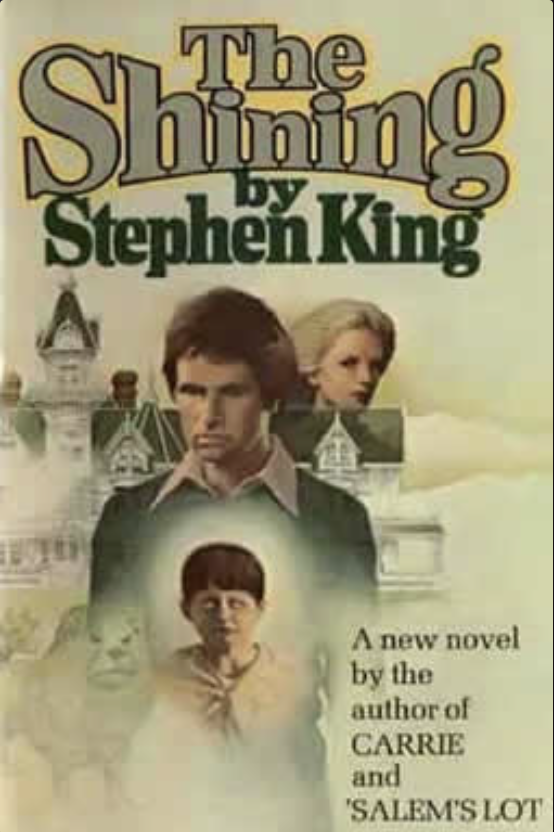
King’s third novel is known for blending a harrowing portrait of addiction and abuse with one of the most terrifying haunted house stories ever written. Jack Torrance begins the winter as caretaker for the Overlook Hotel with intentions of finishing a play and mending his relationship with his wife and son. Unfortunately, the unquiet spirits that lurk within the hotel’s walls play on Jack’s weaknesses and transform him into a murderous monster. Though Stanley Kubrick’s iconic adaptation features an increasingly unhinged Jack Nicholson as the ill-fated father, King’s Jack desperately wants to be a devoted family man. He genuinely tries to leave his vices behind and the novel becomes all the more tragic because of his failure to do so. However, before the Overlook takes full possession of this conflicted man, he shares a happy holiday with his wife and child.
“It was November 29, three days after Thanksgiving. The last week had been a good one, the Thanksgiving dinner the best they’d ever had as a family. Wendy had cooked Dick Hallorann’s turkey to a turn and they had all eaten to bursting without even coming close to demolishing the jolly bird. Jack had groaned that they would be eating turkey for the rest of the winter–creamed turkey, turkey sandwiches, turkey and noodles, turkey surprise.
No, Wendy told him with a little smile. Only until Christmas. Then we have the capon.
Jack and Danny groaned together.”
This brief moment of happiness makes Jack’s recovery seem within reach and we allow ourselves to believe that the Torrance family might just make it to spring after all. Unfortunately, darker snows are waiting to fall, but this scene gives us a chance to spend time with the happy Torrance family before the Overlook seizes them in its icy claws.
Carrie: Mr. Hargensen tastes defeat.
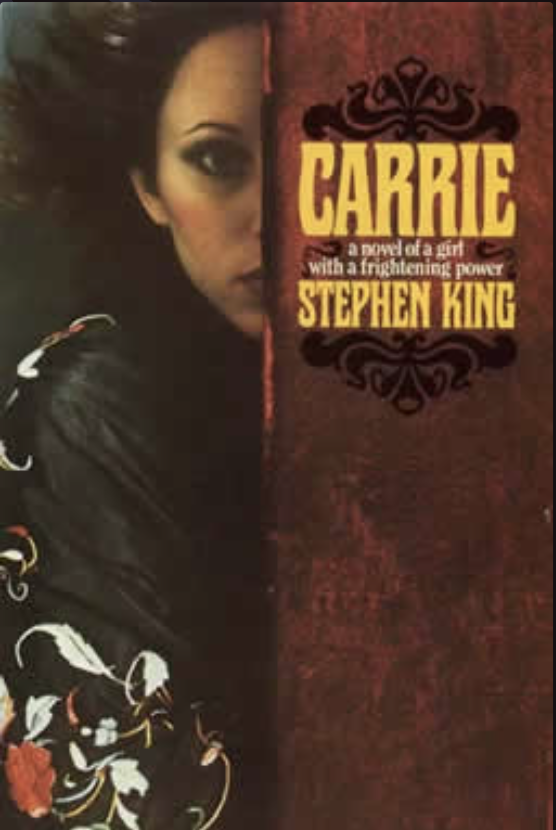
Carrie White is not only one of King’s most destructive characters, she’s also one of the most tragic. This shy high school student spends her days dodging relentless bullying from her classmates and then goes home to extreme religious abuse from her proselytizing mother. When Carrie gets her first period in the locker room after gym class, she has no idea what is happening to her body and honestly believes she’s bleeding to death. Mean girl Chris Hargensen leads the other girls in taunting Carrie and pelting her with pads and tampons. When punishment for her cruelty turns out to be more than the selfish girl can bear, she enlists the help of her powerful lawyer father. Hoping to get her tickets to the prom reinstated, Mr. Hargensen squares off against the school’s principal, Mr. Grayle who insists on holding Chris accountable for what she’s done.
“You apparently haven’t realized all the implications of in loco parentis in this matter, Mr. Hargensen. The same umbrella that covers your daughter also covers Carrie White. And the minute you file for damages on the grounds of physical and verbal abuse, we will cross-file on those same grounds for Carrie White.”
Hargensen’s mouth dropped open and then closed. … Grayle smiled grimly. “I believe you know your way out, Mr. Hargensen. The sanctions against your daughter stand.”
The debut novel from Stephen King climaxes with a much more devastating prank and concludes with the small Maine town consumed in flames. Carrie will be blamed for this destruction and King describes graffiti throughout the town reading, “Carrie White burns in hell.” However, this one moment of support for a tragic girl gives the reader some well-earned catharsis. Not only is Stephen King showing us that Carrie is a victim, but there are people in town who recognize her pain and are willing to stand up for her.
The Dead Zone: Johnny and Sarah enjoy a picnic.
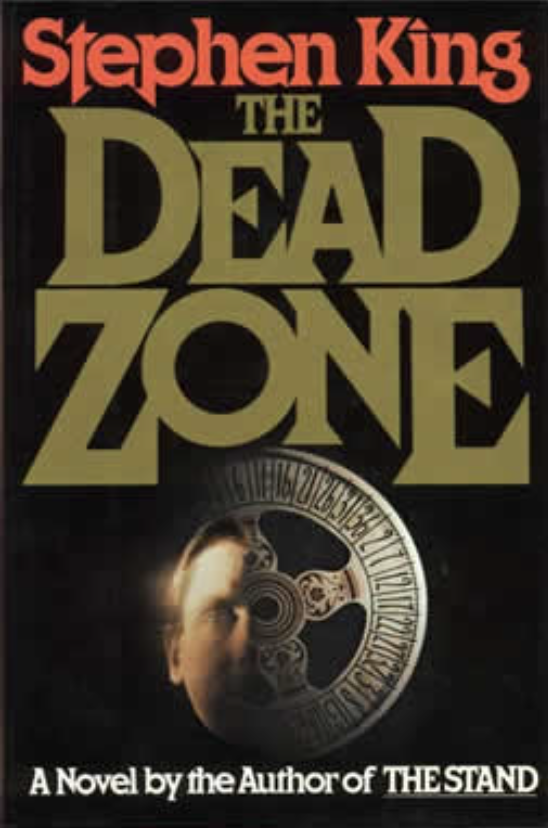
Like Carrie before him, Johnny Smith endures more than his fair share of pain and sorrow. This high school teacher is enjoying an idyllic day at a local fair with his girlfriend Sarah when a car crash dramatically alters the course of his life. Having fallen into a coma, Johnny awakens five years later to learn that Sarah—along with the rest of the world—has moved on without him. He’s also developed the uncanny ability to see the future and dedicates his life to saving humanity from a hellish fate. But before he embarks on the dark road ahead, Johnny spends a quiet afternoon with Sarah reclaiming a tiny bit of the life they might have had together.
“They talked of inconsequential things–there was no hurry. For the first time since he had come out of it, Johnny felt that time was not his enemy. Time had provided them with the little air pocket in exchange for the main flow of which they had been robbed, and it would be here for as long as they needed it.“
Johnny may save the world from a nuclear war, but he gives up everything for his noble cause. The only consolation for this tragic hero is the fact that he gets to enjoy a bittersweet afternoon with the love of his life. Consummating a marriage that never was, we watch these two friends and old lovers enjoy a brief moment of happiness, manufactured though it may be, before Johnny walks into the dead zone forever.
Pet Sematary: Gage flies a kite.
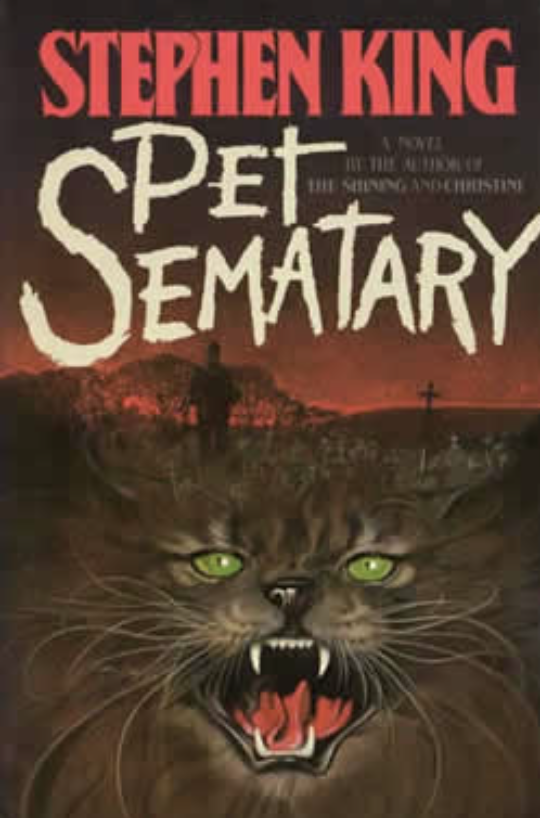
The Stephen King novel from 1983 may be the most frightening of his entire catalog due in large part to its powerful emotional punch. Louis Creed is a young father who falls victim to the sinister power of death lurking in the woods behind his rural home. When his toddler son Gage dies in the road, Louis rationalizes the unthinkable. He digs up Gage’s body and buries him in the stony earth that lies beyond the Pet Sematary. The thing that returns may look like his sweet little boy, but a demonic force lurks behind those innocent eyes. Shortly before this horror unfolds, Louis enjoys a brief day of happiness with the doomed toddler. Father and son spend a warm afternoon flying a kite in a neighboring field just a few short weeks before the Creed family falls apart.
“Gage flyin it?” Gage said as if asking not his father but himself for confirmation. He pulled the string experimentally; the kite nodded in the windy sky. Gage pulled the string harder; the kite swooped. Louis and his son laughed together. Gage reached out his free hand, groping, and Louis took it in his own. They stood together that way in the middle of Mrs. Vinton’s field, looking up at the Vulture.“
In a bit of trademark foreshadowing, Stephen King describes this as the last good day of Louis’s life. Considering what lies ahead, we can be grateful that the well-meaning father gets to enjoy this brief moment in which everything is right with the world before it’s all so cruelly ripped away. King’s beautiful prose combined with his devastating conclusion reminds us to hug our loved ones a little bit closer and savor the moments of joy in our own lives before they slip away forever.
The Stand: Tom and Stu go to the movies.
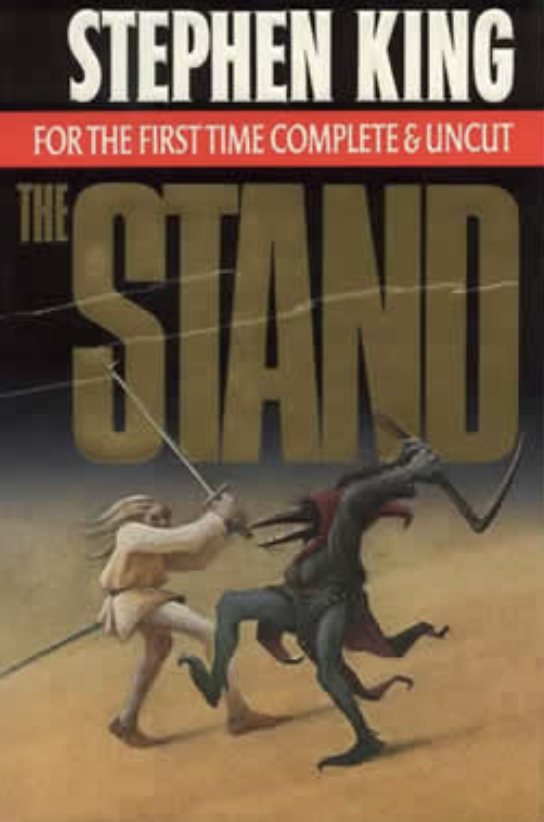
Part sci-fi apocalypse, part religious horror, The Stand is breathtaking in its scope and sprawl. The epic story follows a deadly plague that wipes out the American population and the disparate survivors who try to find each other amidst the wreckage. As they gather in both Boulder and Las Vegas, Stephen King ultimately brings us to an all-consuming battle between good and evil. After the dust settles, two survivors once again find themselves far from home. Stu and Tom must battle their way back to the Free Zone committee and eventually hole up in an abandoned hotel to wait out a blizzard. To pass the time, Stu rigs up a projector and the two friends spend the day enjoying their makeshift movie theater.
“The generator began to chug cheerfully along. Stu shut the door as far as it would go to mute the engine sound and killed the lights. And five minutes later they were sitting side by side, watching Sylvester Stallone kill hundreds of dope-dealers in Rambo IV: The Fire-Fight. Dolby sound blared out at them from the Convention Hall’s sixteen speakers, sometimes so loud it was hard to hear the dialogue (what dialogue there was) … but they had both loved it.“
After losing nearly everyone and everything they’ve ever known, these two friends have finally found a brief moment of safety and peace. In the waning hours of this novel full of death and destruction, they reminisce about the simple pleasures of their former lives and enjoy a piece of an old world that will never be again.
11/22/63: The Jodie Jamboree
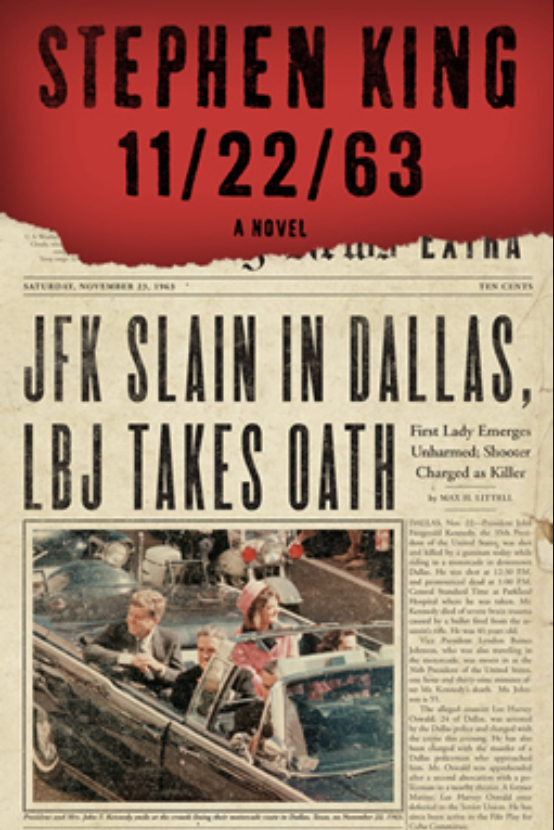
This 2011 novel from Stephen King about the Kennedy assassination is much more than a historical time travel adventure. When Jake Epping journeys back in time to stop Lee Harvey Oswald, he finds himself with five years to kill before the titular day. Having adopted the name George, he spends this time teaching in Jodie, TX where he falls in love with a beautiful librarian named Sadie. In lieu of a school play, the lovebirds organize a variety show featuring skits and musical numbers from students, faculty, and staff. After a moving rendition of the couple’s trademark Lindy Hop, the evening ends with a massive cream pie fight that brings down the house. However, the show-stopping encore is an announcement that all proceeds will go to funding the reconstructive surgery of a student whose face was badly scarred in an accident earlier in the year.
“This was one night in a small town, one of those burgs off the main road that nobody cares about much except for the people who live there. And that’s okay, because they care. I looked at Bobbi Jill, sobbing into her hands. I looked at Sadie. There was cream in her hair. She smiled. So did I. She mouthed I love you, George. I mouthed back I love you, too. That night I loved all of them, and myself for being with them. I never felt so alive or happy to be alive. How could I leave all this behind?“
The novel opens with an exploration of watershed moments and a discussion of J.F.K. ‘s death as a pivotal moment in American history. However, King’s emotional novel argues that moments like the pie fight, though much smaller in scale, are the ones that truly matter. They are the watershed moments we should cling to instead of obsessing over a past we have no power to change.
Elevation: Scott Carey rises.
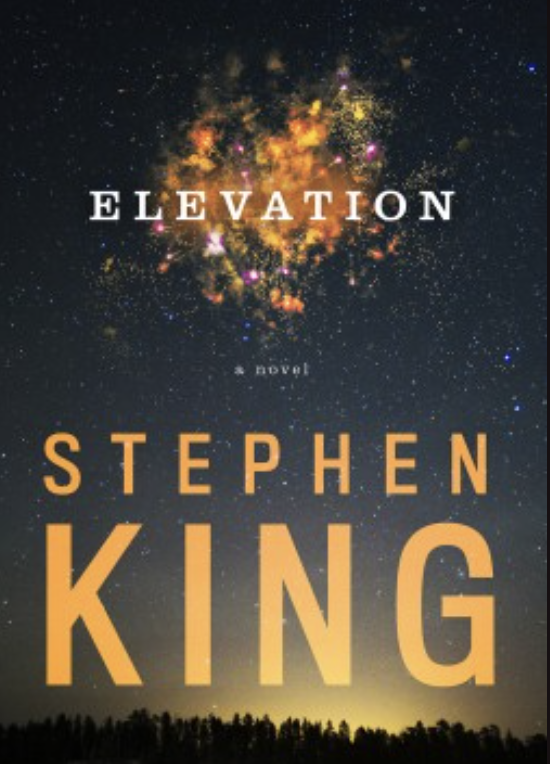
In a reversal of his usual M.O., with Elevation, Stephen King takes a simple but horrific idea and wrings out the joy rather than the terror. Scott Carey is living alone when he notices an anomaly on his bathroom scale. Every day, Scott loses a little bit of weight, regardless of what he does or how much he eats. No physical changes can be seen, but Scott finds increasing difficulty in remaining earthbound and eventually decides to let himself rise up among the stars.
“Now he caught escaping heat from the house, a thermal, and began rising faster. The town disclosed itself as if from a drone or low-flying plane, the streetlamps along Main Street and Castle View like pearls on a string. He could see the Christmas tree that Deirdre had lit over a month ago, and which would remain in the town square until the first of February.
It was cold up here, much colder than on the ground, but that was all right. He let the coverlet go and watched it drop, spreading out as it went, slowing, becoming a parachute, not weightless but almost.
Everyone should have this, he thought, and perhaps, at the end, everyone does. Perhaps in their time of dying, everyone rises.“
This brief novella from Stephen King is a beautiful treatise on chronic illness, death, and the act of letting go. As Scott faces the end of his life, he focuses on honoring his personal relationships and thinking about the legacy he will leave behind. Though Scott’s condition may be vague, his experience of rising into the sky like a carefree balloon is a beautiful recreation of a journey we will all one day face. Hopefully, when our time comes, we will find the courage to rise as well.
Categorized: Editorials
